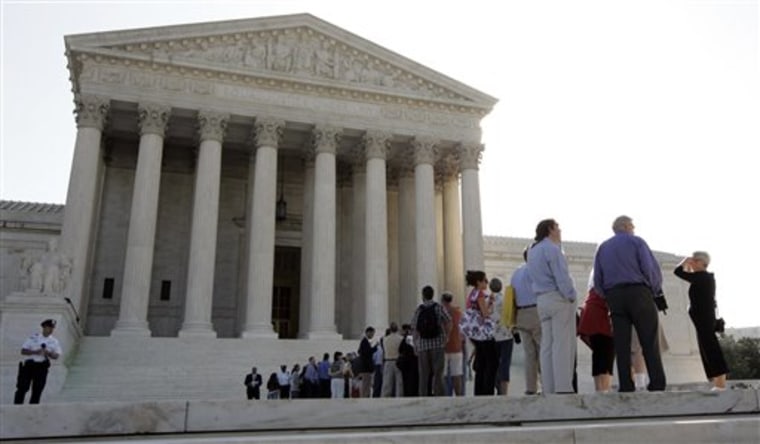The Supreme Court opened its new term Monday refusing to get involved in two church-state disputes - one over religious organizations paying for workers' birth-control health insurance benefits, the other over an evangelical group's plea to hold religious services at a public library.
The court also refused to hear the case of a Guantanamo Bay detainee challenging the legality of the military commission system that plans to try him for war crimes.
Detainee Salim Ahmed Hamdan, who once was the driver for al-Qaida leader Osama bin Laden, is accused of conspiracy and supporting terrorism.
Religion and drug coverage
The birth-control benefits dispute was triggered by a New York state law that forces religious-based social service agencies to subsidize contraceptives as part of prescription drug coverage they offer employees.
New York is one of 23 states that require employers offering prescription benefits to employees to cover birth control pills as well, the groups say. The state enacted the Women's Health and Wellness Act in 2002 to require health plans to cover contraception and other services aimed at women, including mammography, cervical cancer screenings and bone density exams.
Catholic Charities and other religious groups argued that New York's law violates their First Amendment right to practice their religion because it forces them to violate religious teachings that regard contraception as sinful.
"If the state can compel church entities to subsidize contraceptives in violation of their religious beliefs, it can compel them to subsidize abortions as well," the groups said in urging the court to take their case. "And if it can compel church entities to subsidize abortions, it can require hospitals owned by churches to provide them."
Other Catholic and Baptist organizations are part of the lawsuit. Seventh-Day Adventist and Orthodox Jewish groups signed onto a brief filed in support of Catholic Charities.
In the dispute the court rejected a challenge to a similar law in California.
"A church ought to be able to run its affairs and organize relationships with its employees in a way that's consistent with moral values and teachings," said Kevin Baine, a partner at the Williams and Connolly law firm who represents the religious organizations.
The New York law contains an exemption for churches, seminaries and other institutions with a mainly religious mission that primarily serve followers of that religion. Catholic Charities and the other groups sought the exemption, but they hire and serve people of different faiths.
New York's highest court ruled last year that the groups had to comply with the law. The 6-0 decision by the state Court of Appeals hinged on the determination that the groups are essentially social service agencies, not churches.
According to Planned Parenthood, the other states with similar laws are: Arizona, Arkansas, California, Connecticut, Delaware, Georgia, Hawaii, Illinois, Iowa, Maine, Maryland, Massachusetts, Missouri, Nevada, New Hampshire, New Jersey, New Mexico, North Carolina, Rhode Island, Vermont, Washington and West Virginia.
The birth-control benefits case is Catholic Charities of the Diocese of Albany v. Dinallo, 06-1550.
Taxpayer-subsidized religious exercises
In the library case, the 9th U.S. Circuit Court of Appeals in San Francisco had ruled that public libraries can block religious groups like the Faith Center Church Evangelistic Ministries from worshipping in public meeting rooms.
The Contra Costa library system in the San Francisco Bay area allows groups to use its facilities for educational, cultural and community-related programs.
"Although religious worship is an important institution in any community, we disagree that anything remotely community-related must therefore be granted access to the Antioch Library meeting room," the appeals court concluded in a 2-1 decision.
Allowing worship services would amount to having taxpayers subsidize religious exercises, argued the Contra Costa County, Calif., Library Board, which operated the facility in Antioch, Calif.
The library case is Faith Center Church v. Glover, 06-1633.
Detainee and military commissions
in the case of the Guantanamo Bay detainee, Hamdan had sought to combine his case with a separate challenge the Supreme Court is considering regarding Guantanamo Bay detainees. The justices will review the cases of detainees who do not face military commission trials and who are challenging their indefinite confinement. Many of the detainees have been held for over five years.
A year ago, Hamdan brought a successful challenge in the Supreme Court to the military commission system created by President Bush following the Sept. 11, 2001 attacks.
In response, the White House persuaded the Republican-controlled Congress to pass a law approving the military commissions.
In asking the justices to take up Hamdan's case now, his lawyers say the newly enacted law violates his rights because it allows for only a narrow challenge if a defendant is found guilty.
There is no provision for review of a military commission's factual conclusions, lawyers for Hamdan argue. If convicted, Hamdan would face up to life in prison.
A federal judge ruled last December that Hamdan had no rights because he is an alien detained outside the sovereign territory of the United States.
Hamdan is a Yemeni national captured by Afghan forces in Afghanistan and turned over to the American military in November 2001.
The case is Hamdan v. Gates, 07-15.
